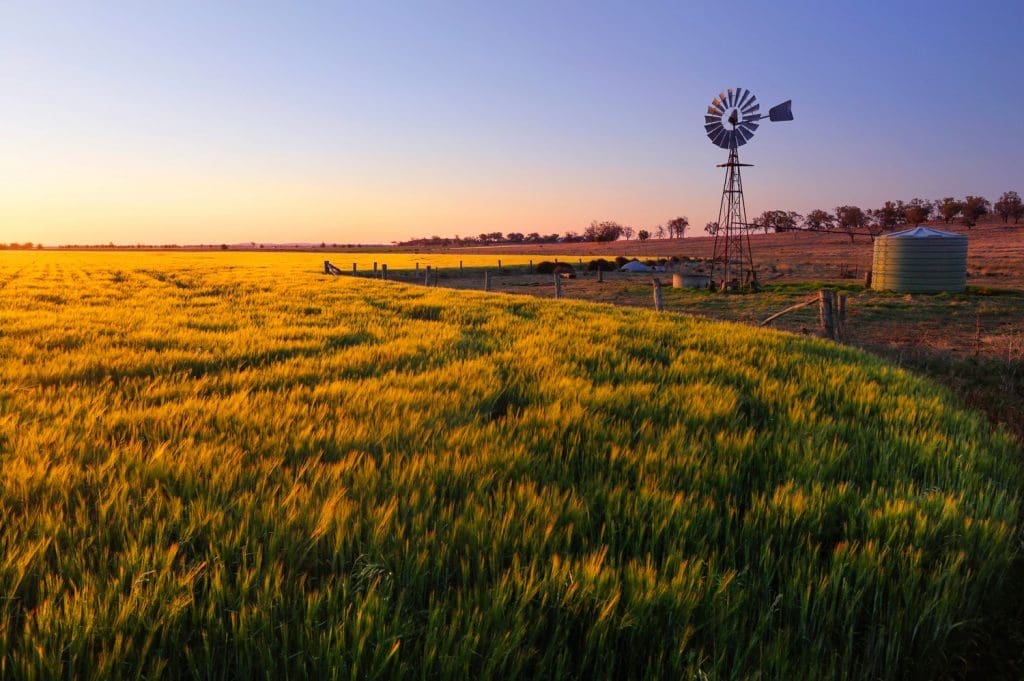
Australian agriculture is a major brand relying on a handful of individual organisations and farmers to handle the critical job of maintaining and building consumer trust. Picture: Australian Export Grains Innovation Centre.
If you think of Australian agriculture as a collective entity, it would rank in revenue terms as Australia’s second largest company.
In 2016-17, the gross value of Australian farm production was more than $63 billion.
By comparison, Wesfarmers, a company with strong roots in agriculture and the owner of Coles supermarkets and other big retail brands like Bunnings, Kmart, Target and Officeworks, generated $68 billion in revenue in the same financial year.
Not far behind was another company closely connected to agriculture, Australia’s other supermarket giant Woolworths, which owns big brands like Dan Murphys, BWS and Big W, with revenue of $56 billion.
Rounding out the top 10 are the major banks (Commonwealth, Westpac, NAB and ANZ) and the big miners Rio Tinto and BHP Billiton ($31.6b).
What is one thing that all of these big players have in common?
Well, there may well be more than one, but one thing we can identifiy is that they all invest heavily in marketing to promote their brands to build trust with their consumers and the wider community.
It’s rare to turn on a television or open an online screen without seeing a marketing message from at least one of these major brands appearing before our eyes.
The mining sector collectively also proactively runs public awareness campaigns to remind all Australians about the importance of the industry to jobs, the economy and to the prosperity of the nation.
Australian agriculture produces more annual revenue than most of biggest brands.
It is an economic powerhouse, generating 1.6 million jobs across the supply chain (figures provided by the National Farmers Federation).
It is also Australia’s fastest growing industry, have surged by 23 percent in value in the past financial year.
Yet, as a collective industry, Australian agriculture is rarely visible to the city-based voting public.
At the same time numerous interest groups and Non-Government Organisations work tirelessly to undermine public trust in agriculture, often through cherry picked claims that paint a misleading picture of the whole sector, adding to an ever-increasing burden of regulation on Australian farmers which further diminishes their viability.
Last month, in the lead up to the inaugural National Agriculture Day – a great step in the right direction for promoting agriculture – research commissioned by the NFF indicated that 83 percent of Australians would describe their connection with farming as ‘distant’ or ‘non-existent’.
There is nothing new about that, but the black and white data reinforces the extent to which most Australians have become even more disconnected from where their food and fibre originates, and how unaware they are of the farm sector’s vital importance to our national economy.
So what are we doing as a collective sector to counter this serious public awareness problem?
There are some really positive stories happening if you go looking for them.
The first National Agriculture Day on November 21, an initiative of the NFF, Gina Rinehart’s Hancock Prospecting, the Federal Government and Coles (there’s one of those big brands again) was a long overdue step forward, and clearly helped to generate some important balancing mainstream media coverage of the importance of Australian agriculture.
Some years ago Queensland farming group Agforce launched a series of ‘Every Family Needs a Farmer Campaign’ television advertisements in an attempt to counter the public portrayal of farmers as environmental vandals led by green groups campaigning to end tree-clearing.
Meat and Livestock Australia’s Target 100 program helps to showcase the important work Australian farmers do to protect the environment and animal welfare.
A proactive host of individual farmers and rural advocates actively promote and defend their industry on online channels and social media, or spend time spreading the word in schools – for just one example see our earlier article about this year’s Young Lot Feeder of the Year award winner Thomas Green.
Each of these efforts are individually valuable, inspiring and vital.
But, on their own, not nearly enough.
Australian agriculture is a major brand relying on a handful of individual organisations and farmers to shoulder the crucial task of maintaining and building consumer trust for the entire sector.
Isn’t it time for a collective, industry-wide effort?
Think back to those other big brands, and what they spend to maintain public support. Australia’s largest company Wesfarmers, for example, spends over $200 million on advertising in a single year.
Can Australian agriculture afford to advertise its message to the Australian public?
It is worth noting that 2016-17, the Department of Agriculture disbursed $790.8 million in grower-generated levies, plus matching Commonwealth payments, to 18 levy recipient bodies.
A large portion of this revenue is collected for the purpose of industry research and development and marketing.
Just a small share of this collective funding could play a big role in ensuring the Australian public, and Australia’s political decision-makers, better understand the true value of Australian farming.
Amid an ever-rising tide of anti-agriculture headlines and agenda-driven campaigns continually seeking to undermine a disconnected public’s confidence in the food production sector, the question we really need to ask is this:
Can Australian agriculture afford not to promote itself more actively?
